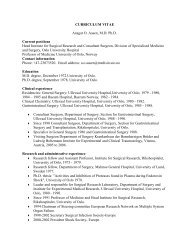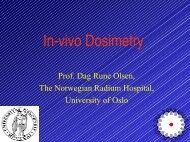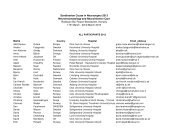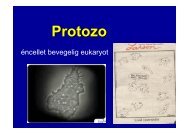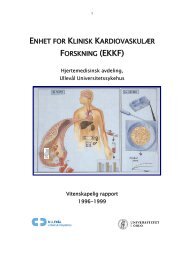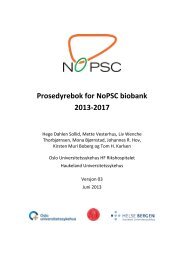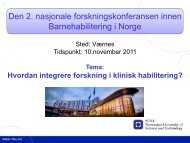Novel genetic and epigenetic alterations in ... - Ous-research.no
Novel genetic and epigenetic alterations in ... - Ous-research.no
Novel genetic and epigenetic alterations in ... - Ous-research.no
Create successful ePaper yourself
Turn your PDF publications into a flip-book with our unique Google optimized e-Paper software.
Volume 10 Number 7 July 2008 pp. 680–686 680www.neoplasia.comRAS Signal<strong>in</strong>g <strong>in</strong> ColorectalTerje Ahlquist* ,† , Irene Bottillo ‡,§ ,Carc<strong>in</strong>omas throughAlterations of RAS, RAF,NF1, <strong>and</strong>/or RASSF1A 1St<strong>in</strong>e A. Danielsen* ,† , Gunn I. Mel<strong>in</strong>g ,# ,Torleiv O. Rognum # , Guro E. L<strong>in</strong>d* ,† ,Bru<strong>no</strong> Dallapiccola ‡,§ <strong>and</strong> Ragnhild A. Lothe* ,†*Department of Cancer Prevention, Institute for CancerResearch, Norwegian Radium Hospital, RikshospitaletUniversity Hospital, Oslo, Norway; † Centre for CancerBiomedic<strong>in</strong>e, University of Oslo, Oslo, Norway;‡ IRCCS-CSS, San Giovanni Rotondo <strong>and</strong> CSS-MendelInstitute, Rome, Italy; § Department of ExperimentalMedic<strong>in</strong>e <strong>and</strong> Pathology, “Sapienza, University ofRome,” Rome, Italy; Surgical Department, FacultyDivision Akershus University Hospital, University ofOslo, Oslo, Norway; # Institute of Forensic Medic<strong>in</strong>e,Rikshospitalet-Radiumhospitalet Medical Centre,University of Oslo, Oslo, NorwayAbstractMore than half of all colorectal carc<strong>in</strong>omas are k<strong>no</strong>wn to exhibit an activated mitogen-activated prote<strong>in</strong> k<strong>in</strong>asepathway. The NF1 gene, a negative regulator of KRAS, has <strong>no</strong>t previously been exam<strong>in</strong>ed <strong>in</strong> a series of colorectalcancer. In the present study, primary colorectal carc<strong>in</strong>omas stratified accord<strong>in</strong>g to microsatellite <strong>in</strong>stability statuswere analyzed. The whole cod<strong>in</strong>g region of NF1 was analyzed for mutations us<strong>in</strong>g denatur<strong>in</strong>g high-performanceliquid chromatography <strong>and</strong> sequenc<strong>in</strong>g, <strong>and</strong> the copy number <strong>alterations</strong> of NF1 were exam<strong>in</strong>ed us<strong>in</strong>g multipleligation-dependent probe amplification <strong>and</strong> real-time polymerase cha<strong>in</strong> reaction. The mutational hot spots <strong>in</strong> KRAS<strong>and</strong> BRAF were sequenced, <strong>and</strong> promoter hypermethylation status of RASSF1A was assessed with a methylationspecificpolymerase cha<strong>in</strong> reaction. One sample had two missense mutations <strong>in</strong> NF1, whereas n<strong>in</strong>e additional tumorshad <strong>in</strong>tronic mutations likely to affect exon splic<strong>in</strong>g. Interest<strong>in</strong>gly, 8 of these 10 tumors were microsatellite-unstable.Four other tumors showed a duplication of NF1. Mutations <strong>in</strong> KRAS <strong>and</strong> BRAF were mutually exclusive <strong>and</strong> werepresent at 40% <strong>and</strong> 22%, respectively. RASSF1A was hypermethylated <strong>in</strong> 31% of the samples. We show that theRAS signal<strong>in</strong>g network is extensively dysregulated <strong>in</strong> colorectal carc<strong>in</strong>omas, because more than 70% of the tumorshad an alteration <strong>in</strong> one or more of the four exam<strong>in</strong>ed components.Neoplasia (2008) 10, 680–686IntroductionColorectal cancer (CRC) is one of the lead<strong>in</strong>g causes of cancer-relateddeaths <strong>in</strong> the western world today, <strong>and</strong> at least 50% of CRCs arethought to have a dysregulation of the RAS-RAF-MEK-ERK pathway,also k<strong>no</strong>wn as the mitogen-activated prote<strong>in</strong> k<strong>in</strong>ase (MAPK)pathway [1]. When activated, this pathway leads to <strong>in</strong>creased proliferation<strong>and</strong> reduced apoptosis, two of six crucial abilities of a cancercell, as described by Hanahan <strong>and</strong> We<strong>in</strong>berg [2]. There are severalcomponents <strong>in</strong> this pathway, which, theoretically, could be affected<strong>in</strong> cancer, <strong>and</strong> some are k<strong>no</strong>wn mutational targets <strong>in</strong> cancer such asKRAS <strong>and</strong> BRAF. KRAS has been widely established as an importantAbbreviations: CRC, colorectal cancer; MAPK, mitogen-activated prote<strong>in</strong> k<strong>in</strong>ase;MSI, microsatellite <strong>in</strong>stability; MSS, microsatellite stable; dHPLC, denatur<strong>in</strong>g highperformanceliquid chromatography; MSP, methylation-specific PCR; MLPA, multipleligation-dependent probe amplificationAddress all correspondence to: Ragnhild A. Lothe, Department of Cancer Prevention,Institute for Cancer Research, Norwegian Radium Hospital, Montebello, 0310 Oslo,Norway. E-mail: ragnhild.a.lothe@rr-<strong>research</strong>.<strong>no</strong>1 This article refers to supplementary materials, which are designated by Tables W1<strong>and</strong> W2 <strong>and</strong> are available onl<strong>in</strong>e at www.neoplasia.com.Received 19 February 2008; Revised 12 April 2008; Accepted 18 April 2008Copyright © 2008 Neoplasia Press, Inc. All rights reserved 1522-8002/08/$25.00DOI 10.1593/neo.08312





